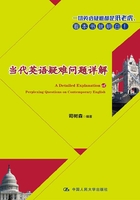
14 这里的almost wasn’t等于almost didn’t occur
问:有这样几个句子:
(1)But you can bet the rent it will be about the summit that almost wasn’t.
译者认为almost wasn’t等于almost didn’t occur,对吗?
(2)He will be coming home, anything from now for the special purpose of apologizing to his father and begging for forgiveness.
请解释一下该句中“anything”的用法。
(3)I suggest you don’t ask him for the vacation.
我认为应把该句改为:
(4)I suggest you(should)not ask him for the vacation.
不知对否?请解释。
答:句(1)中的wasn’t在此意为“未举行”。be意为“举行;发生(happen, occur, take place)”,这是动词be的通常用法之一。译者是对的。例如:
(5)There’s going to be a concert on Saturday.(星期六将举行一场音乐会。)
(6)The party she expected was never to be.(她所期盼的舞会从未举办。)
“举行”是其中的一种译法。还可译为“发生(某事)”或“存在(某种情况)”。例如:
(7)When a thing has to be, it had better be quickly.
(8)This discovery was to have a major effect on the treatment of heart disease.(这个发现对心脏病的治疗产生了重大影响。)
句(2)中的anything相当于anytime(任何时候),表示一不确切的时间。anything常用以表示任一数量、时间或品质。例如:
(9)An average rate of anything between 25 and 60 per cent is usual.
(10)Fights with his father lasted anything(anytime)between fifteen minutes and an hour.(他跟父亲的争吵都要持续大约15分钟到一个小时。)
(11)Grated lemon peel gives a fresh flavour to anything from soup to fruit.
上述句(3)并不错。在当代英语中,suggest、demand等动词后面的宾语从句不但可用现在虚拟式“(should)+动词原形”,也可用一般现在时。又如:
(12)I suggest you ask him some specific questions about his past.
(13)The opposition have demanded that all the facts(should)be made public.(反对派要求把所有的事实都公之于世。)